DNS (Domain Name System) Security refers to the practices and technologies used to protect the DNS infrastructure from various threats and vulnerabilities. The DNS system is a critical component of the internet, responsible for translating domain names into IP addresses, allowing users to access websites and other online services. As such, ensuring the security and integrity of the DNS infrastructure is essential to maintaining a secure and reliable internet experience.

- DNS Spoofing: One of the most common threats to DNS security is DNS spoofing, also known as DNS cache poisoning. This occurs when an attacker intercepts and alters DNS responses, redirecting users to malicious websites or servers. To mitigate this threat, organizations can implement measures such as DNSSEC (Domain Name System Security Extensions), which adds cryptographic signatures to DNS records to verify their authenticity.
- DDoS Attacks: Distributed Denial of Service (DDoS) attacks can target DNS servers, overwhelming them with a large volume of traffic and causing service disruptions. Organizations can protect against DDoS attacks by implementing robust network security measures, such as firewalls and intrusion detection systems, as well as using DNS service providers that offer DDoS protection.
- DNS Tunneling: DNS tunneling is a technique used by attackers to bypass network security controls and exfiltrate data by encoding it within DNS queries. To prevent DNS tunneling, organizations can monitor DNS traffic for suspicious patterns and implement DNS filtering tools that can block unauthorized data transfers.
- Cache Poisoning: DNS cache poisoning occurs when a malicious actor injects false information into a DNS resolver’s cache, leading to incorrect resolution of domain names. Organizations can mitigate this threat by regularly flushing the DNS cache, implementing secure DNS server configurations, and using reputable DNS service providers.
- Man-in-the-Middle Attacks: In a Man-in-the-Middle (MitM) attack, an attacker intercepts communication between two parties, such as a user and a DNS server, to eavesdrop on or manipulate the data being exchanged. To prevent MitM attacks on DNS traffic, organizations can use encrypted communication protocols such as DNS over HTTPS (DoH) or DNS over TLS (DoT) to secure data transmission.
- Phishing Attacks: Phishing attacks often rely on deceptive domain names to trick users into divulging sensitive information or downloading malware. Organizations can combat phishing attacks by implementing email authentication protocols such as SPF (Sender Policy Framework) and DMARC (Domain-based Message Authentication, Reporting, and Conformance) to verify the authenticity of email senders.
- Insider Threats: Insider threats pose a significant risk to DNS security, as malicious insiders with access to privileged accounts can abuse their privileges to manipulate DNS records or disrupt services. Organizations can mitigate insider threats by implementing strict access controls, conducting regular security audits, and monitoring user activity for suspicious behavior.
DNS security plays a crucial role in safeguarding the integrity and availability of the internet infrastructure. By implementing best practices such as deploying DNSSEC, protecting against DDoS attacks, monitoring for malicious activity, and educating users about phishing risks, organizations can enhance their overall cybersecurity posture and ensure a safer online experience for all stakeholders.
Overviews of the 10 Best DNS Security Services
CSCDBS
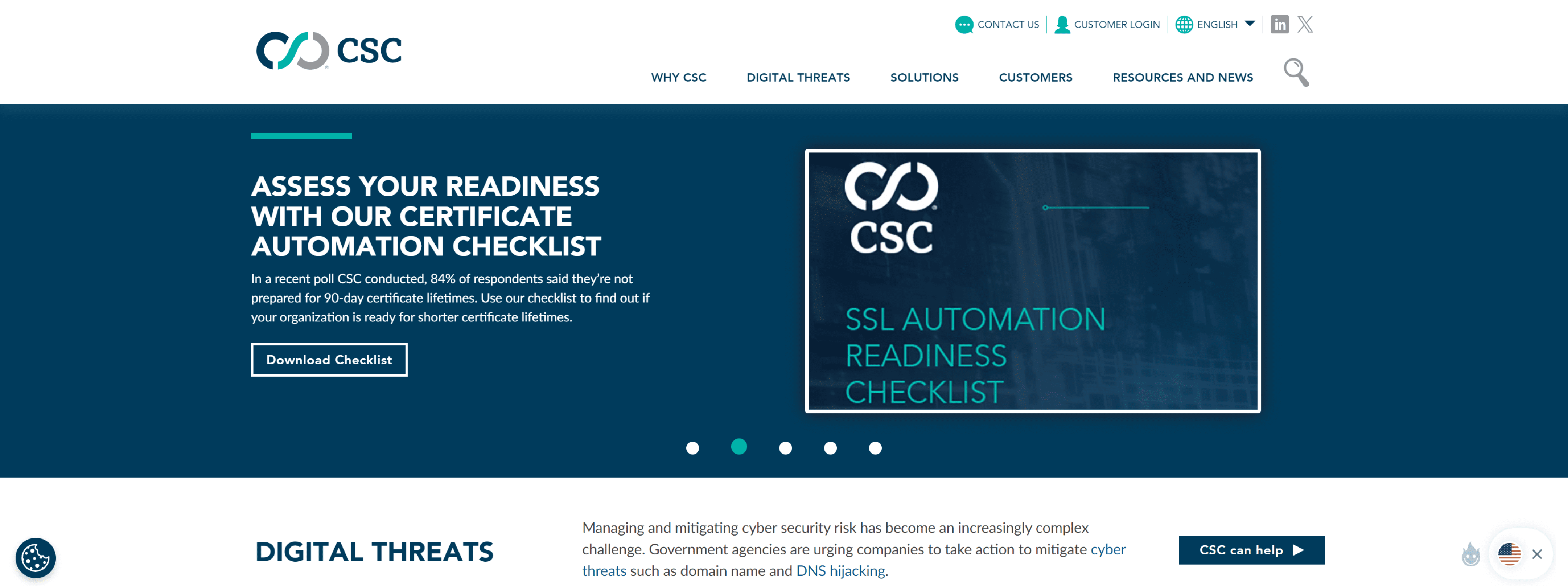
CSC’s DNS services provide the longest credible 100% uptime in the industry, built-in DDoS protection, enhanced performance, security, and much more.
- Longest credible 100% uptime in the industry
- Enhanced performance and security provided by a global network of private connections
- The quickest DDoS mitigation in the industry from Vercara—the market leader for DDoS prevention solutions
- 30 nodes, with an additional 18 nodes on a secondary network, across six continents
- Built-in distributed denial of service (DDoS) protection and domain name system security extensions (DNSSEC)
- Advanced features like DNSSEC, CNAME flattening (ALIAS records), geo-location, weighted load balancing, and failover
- Management of over 37B global queries per day
- 15 DDoS scrubbing centers with over 15 Tbps bandwidth
- Seamless integration with CSCDomainManager, allowing web access to your CSC domain name portfolio, and automatic identification of business-critical domains to monitor for security blind spots
EFFICIENTIP

The 360° DNS Security solutions from EfficientIP provides protection against all DNS attack types: zero day, DDoS, data exfiltration, DNS hijacking, etc.
- Simpler Architecture, Faster Deployment, Easier Management of Your Network
- Market-leading Performance for Maximizing Your DDoS Protection and Business Growth
- Patented DNS Security Technology to Keep Your Business Up and Running
- Broader Data Visibility to Give You More Control Over Your Networkg
- Flexibility and Advanced Network Automation to Save You Time, and Enforce Your Policies
- Smarter App Traffic Steering to Ensure Optimal User Experience
VERCARA

Vercara UltraDDR delivers affordable, reliable DNS protection, blocking threats to keep your digital presence secure and tailored to organizational needs.
- Stop ransomware, phishing, and supply chain attacks before they start
- Employ a global network of secure recursive servers offering security, reliability, and lightning-fast response
- Deliver company-wide protection at work, at home, and on the go
- Control costs by implementing a cloud-based solution
- Block queries to bad domains to prevent attacks
- Enforce corporate internet usage standards with category-based content web filtering and block or allow lists
DNSFILTER
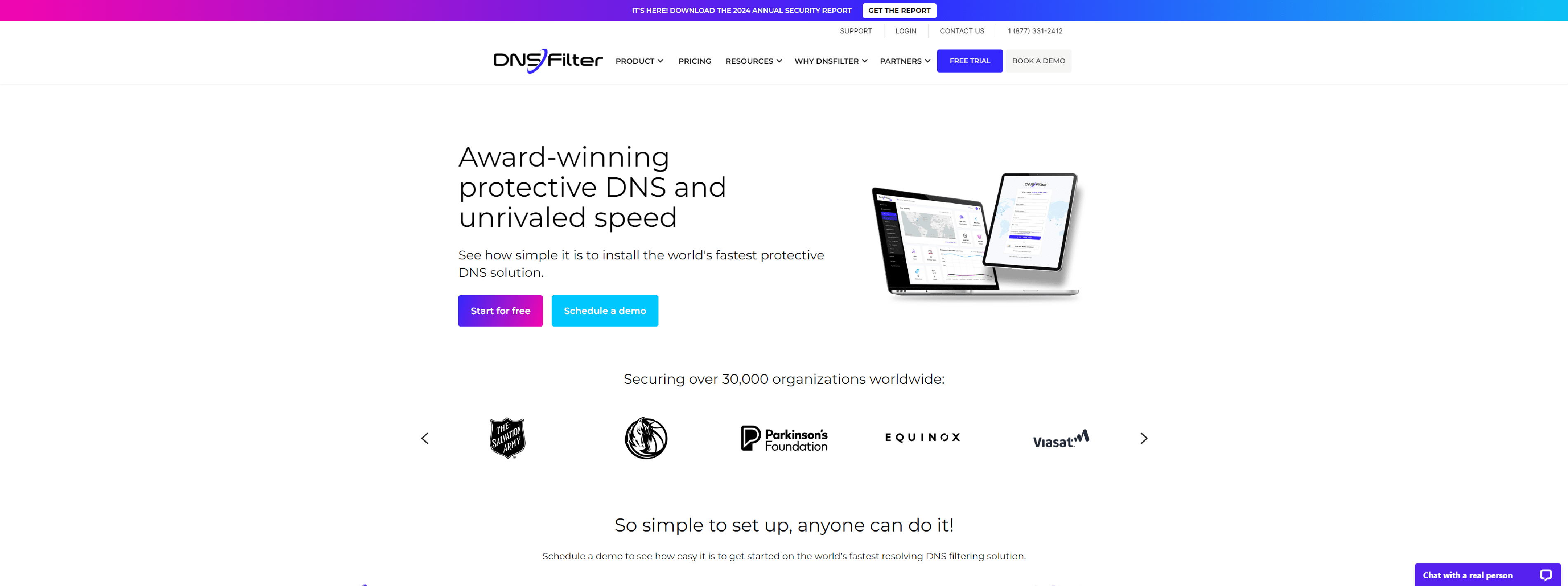
DNSFilter provides industry-leading protective DNS and content filtering solutions. Join over 30,000 organizations worldwide and sign up for a free trial today.
- Secure your network with smarter content filtering
- Stay protected with next-gen machine learning
- Discover vulnerabilities with intuitive insights reporting
- Protect against threats with one-click application blocking
- DNS security and content filtering for every need
NS1
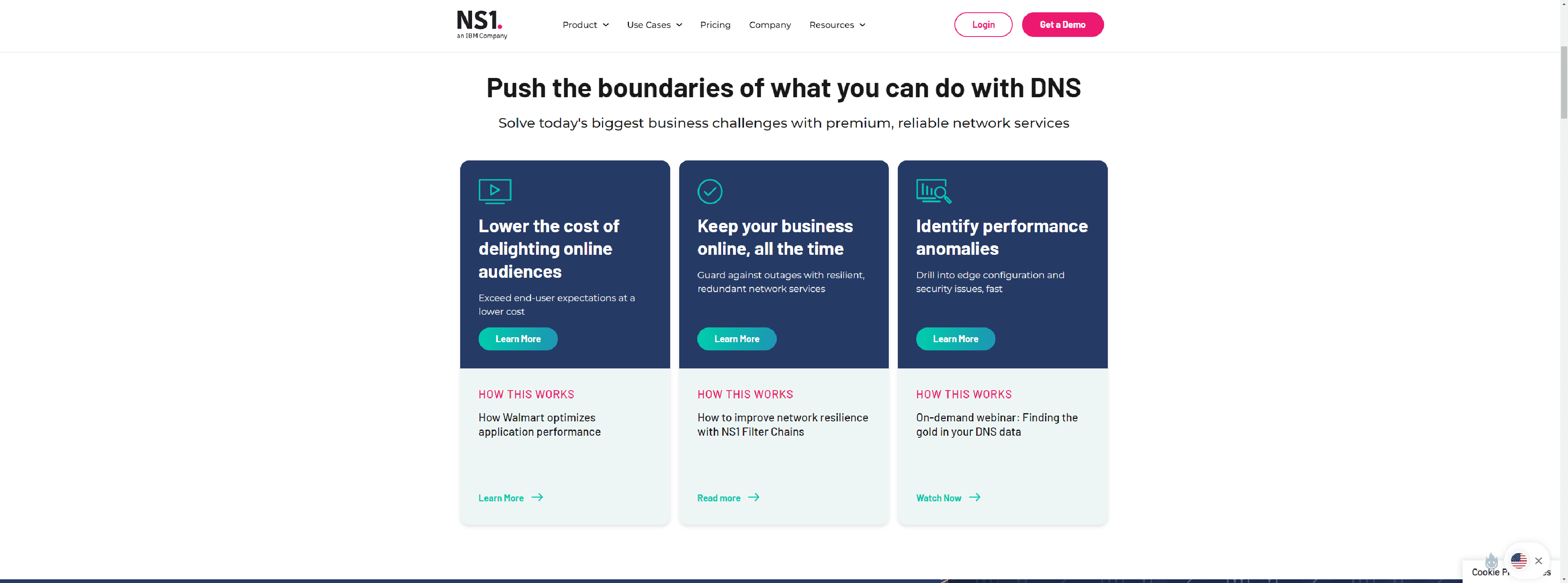
NS1 – A secure DNS is essential for an organization online presence on the internet as well as for its applications on the internal private network.
- Flood Attack
- Random Subdomain Attack
- Cache Poisoning
- DNS Protocol Attacks
- BGP Hijacking Attack
- DNS Tunneling
- DNS Hijacking (Credential Theft)
- Domain Theft
- DNS Amplification Attack (DNS Flood)
CATONETWORKS
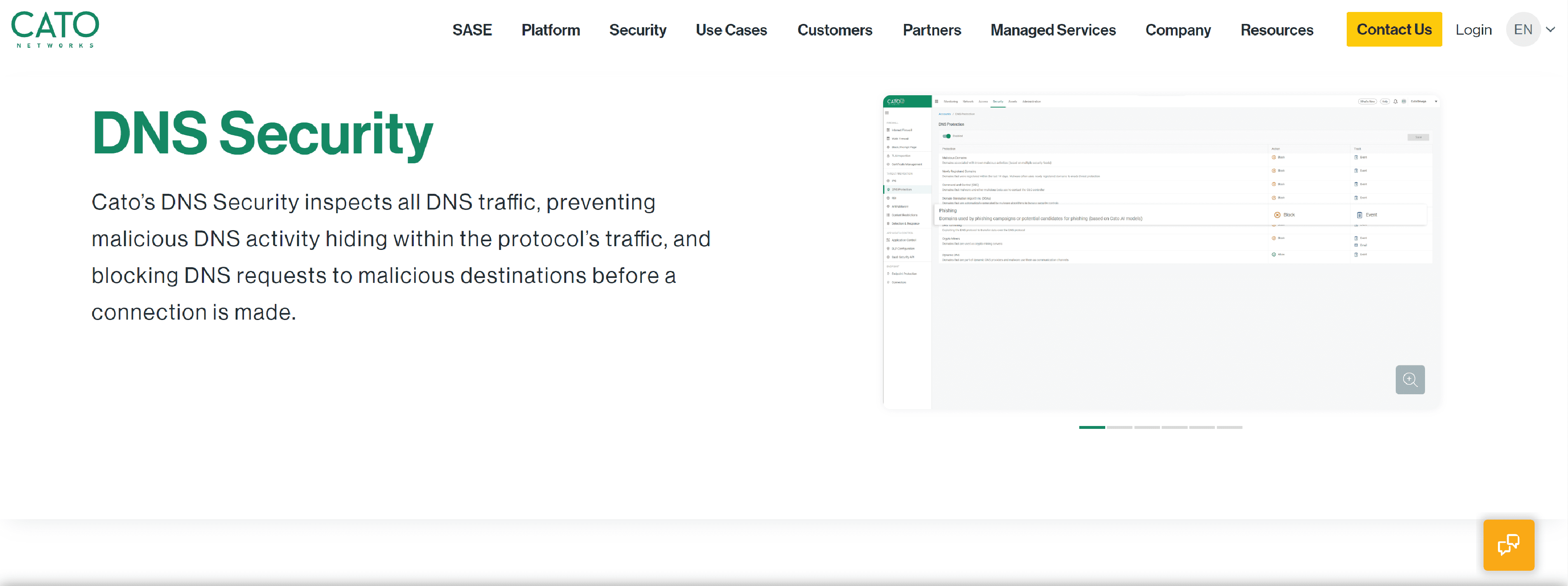
Cato’s DNS Security inspects all DNS traffic, preventing malicious activity attempts hiding within the protocol’s traffic and blocking DNS requests to malicious destinations before a connection is made.
- AI-based DNS Inspection Deliver Superior In-line Phishing Protection
- Block Malicious Domains and C&C Sites Before Connection
- Stop Data Loss and Malicious Activity over DNS Tunneling
- Prevent Resource Leaching from Crypto Miners
- Reduced Risk by Blocking Newly-registered Domains
- Full Visibility into DNS Security Threats and Events
PALOALTONETWORKS
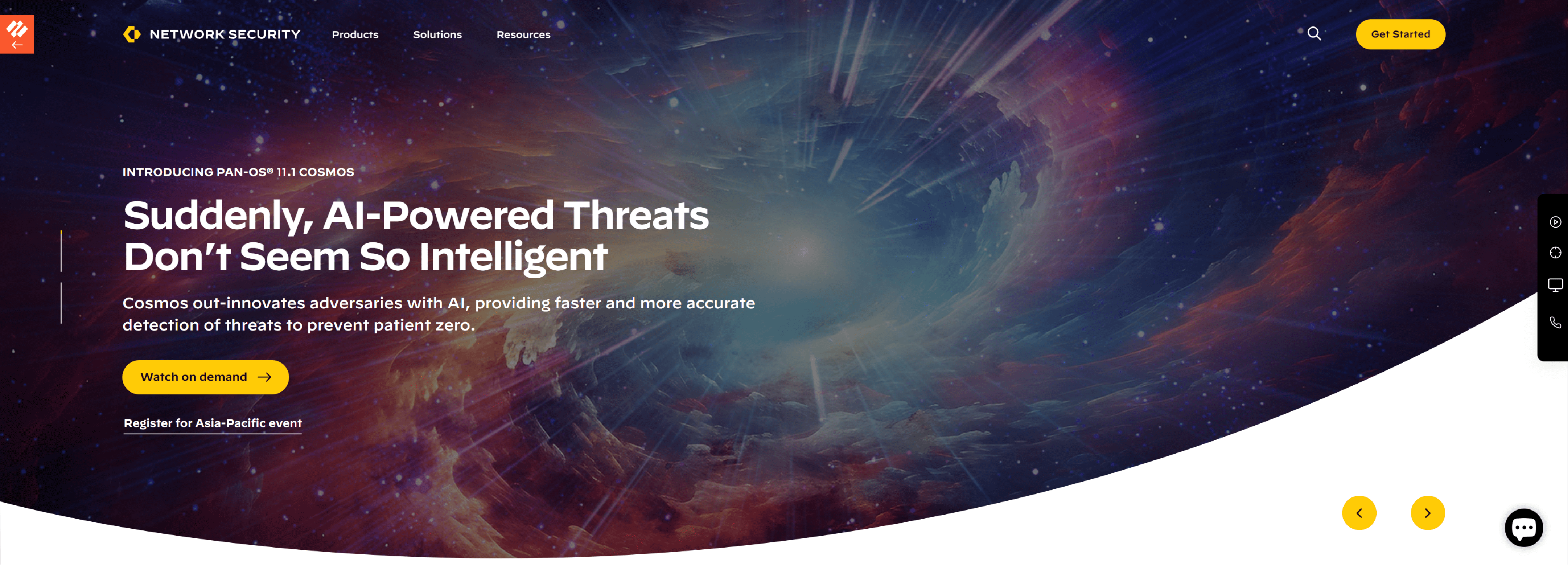
Palo Alto Networks DNS Security uses inline deep learning to provide 40% more DNS-layer threat coverage and disrupt 85% of malware that abuses DNS for malicious activity.
- Unparalleled protection from DNS-based threats
- Comprehensive visibility into your blind spots
- Instantly block malicious domains
- Native integration with your NGFW
- Flexible deployment options
IBOSS
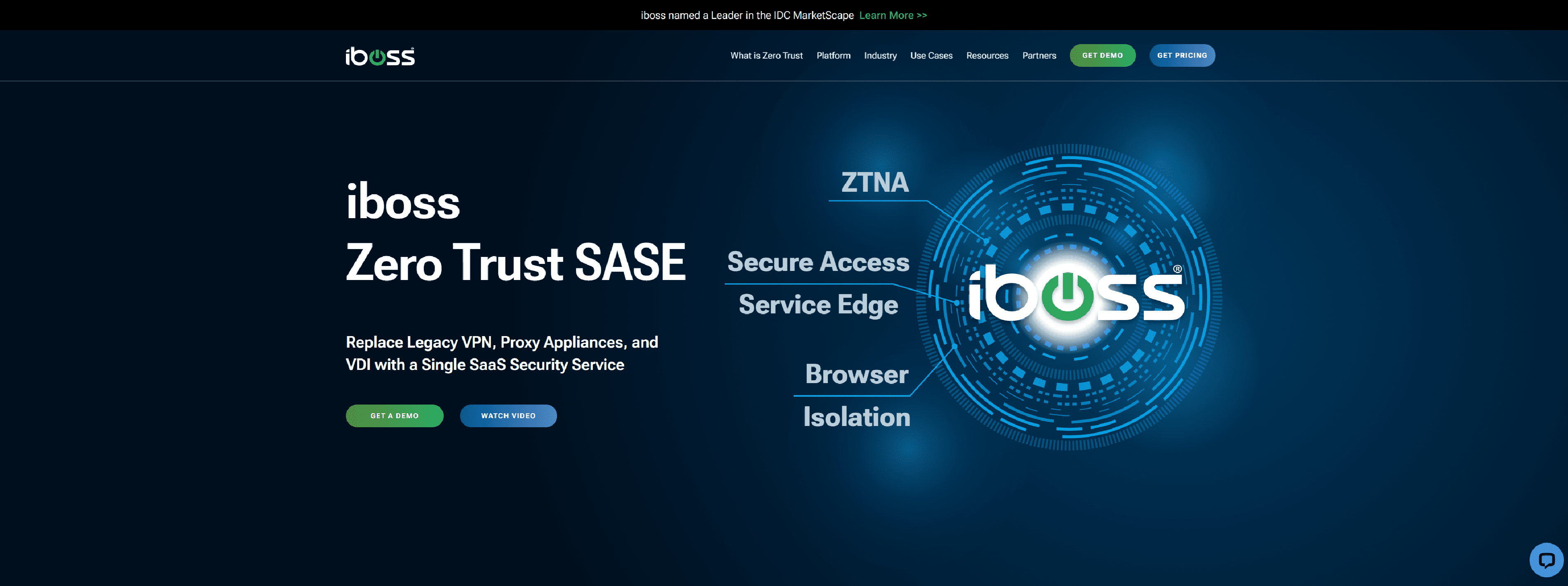
Iboss Zero Trust SASE reduces risk by allowing only trusted users to securely and directly connect to protected resources from anywhere.
- Easily configure guest network settings so that devices automatically receive protection
- Web Filtering and Malware Protection with reporting
- Unique policies can be applied to each guest network
SAFEDNS
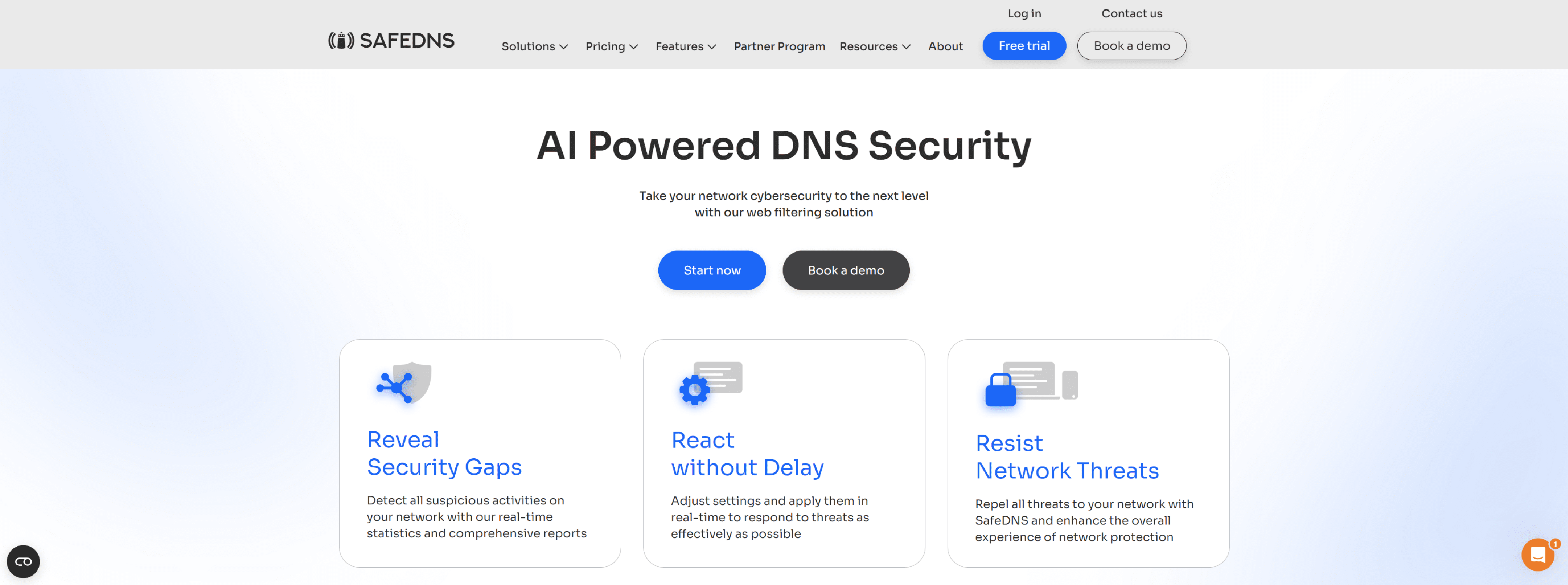
SafeDNS – Powered by artificial intelligence, we help businesses and families stay protected with our web and content filtering.
- DNS Security
- APP Blocker
- Content Filtering
- Reports & Analytics
- Roaming Clients
- AI Powered Categorization
- Compliance
- Anycast network
- Schedule
- Checkwebsite
ALLOT
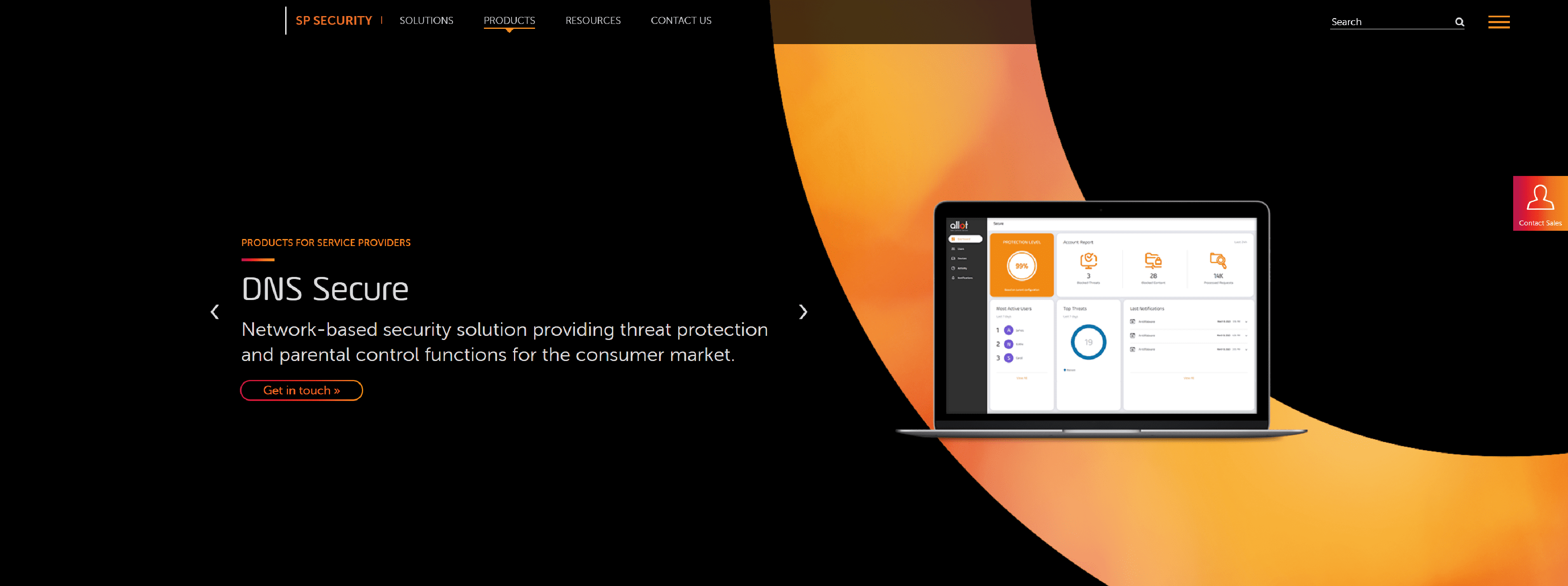
Allot is a global provider of leading innovative network intelligence and security solutions for Service Providers and Enterprises worldwide.
- Zero-touch, clientless, frictionless onboarding and built-in customer engagement tools
- Designed for the mass market, no installation or set up required, achieving high adoption rates
- Yields exceptionally high Net Promoter Scores (NPS)
Selection Criteria for DNS Security Services
When selecting DNS security services for your organization, it’s important to consider several key criteria to ensure that you choose a solution that meets your specific needs and provides effective protection against DNS-related threats. Here are some key selection criteria to consider:
- Security Features: Look for DNS security services that offer a comprehensive range of security features to protect against various threats, such as DNS spoofing, DDoS attacks, cache poisoning, and malware. Ensure that the service includes features like DNSSEC support, DDoS protection, threat intelligence feeds, and real-time monitoring capabilities.
- Scalability: Consider the scalability of the DNS security service to accommodate your organization’s current and future needs. Ensure that the service can handle increasing volumes of DNS traffic and scale up or down based on demand without impacting performance or security.
- Reliability and Availability: Choose a DNS security service that provides high availability and reliability to ensure uninterrupted access to your critical online services. Look for providers with a robust infrastructure, redundant data centers, and failover mechanisms to minimize downtime and ensure continuous service availability.
- Performance: Evaluate the performance of the DNS security service in terms of latency, response times, and throughput to ensure optimal performance for your users. Consider factors such as global server distribution, network capacity, and caching mechanisms to deliver fast and efficient DNS resolution.
- Ease of Deployment and Management: Select a DNS security service that is easy to deploy, configure, and manage, even for organizations with limited IT resources or expertise. Look for services with intuitive management interfaces, automated configuration options, and centralized monitoring and reporting capabilities.
- Integration with Existing Security Infrastructure: Ensure that the DNS security service can seamlessly integrate with your organization’s existing security infrastructure, such as firewalls, intrusion detection systems, SIEM (Security Information and Event Management) solutions, and threat intelligence platforms. Look for services that support industry-standard protocols and APIs for easy integration.
- Compliance and Regulatory Requirements: Verify that the DNS security service complies with relevant industry regulations and standards, such as GDPR (General Data Protection Regulation), HIPAA (Health Insurance Portability and Accountability Act), PCI DSS (Payment Card Industry Data Security Standard), and others. Ensure that the service provides features to help you meet compliance requirements and protect sensitive data.
- Support and Customer Service: Consider the level of customer support and service provided by the DNS security service provider. Look for providers with responsive support teams, 24/7 availability, SLAs (Service Level Agreements), and proactive monitoring to address any issues or concerns promptly.
- Cost and Pricing Model: Evaluate the cost of the DNS security service, including subscription fees, licensing costs, setup fees, and any additional charges for premium features or support services. Compare pricing models (e.g., per-user, per-domain, or usage-based) to determine the most cost-effective option for your organization.
By considering these selection criteria when choosing DNS security services for your organization, you can make an informed decision that aligns with your security requirements, budget constraints, and operational needs. Conduct thorough research, request demos or trials from potential providers, and seek recommendations from trusted sources to ensure that you select a reliable and effective DNS security solution that enhances your overall cybersecurity posture.
Most Common Questions Regarding DNS Security Services (FAQ)
What is DNS security?
DNS security refers to the measures and techniques used to protect the Domain Name System (DNS) infrastructure from various threats, such as DNS spoofing, DDoS attacks, cache poisoning, and malware. DNS security services help organizations secure their DNS infrastructure, prevent unauthorized access, and ensure the integrity and availability of DNS services.
Why is DNS security important?
DNS is a critical component of the internet infrastructure, translating domain names into IP addresses to facilitate communication between devices. Securing the DNS infrastructure is essential to prevent cyberattacks that can disrupt services, compromise data, and undermine the trust and reliability of online communications. DNS security helps protect against various threats and vulnerabilities that can exploit weaknesses in the DNS system.
What are common threats to DNS security?
Common threats to DNS security include DNS cache poisoning, DNS spoofing, DDoS attacks, DNS tunneling, DNS hijacking, and malware targeting DNS servers. These threats can lead to service disruptions, data breaches, unauthorized access, and other security incidents that can impact an organization’s operations and reputation.
How do DNS security services work?
DNS security services use various techniques and technologies to protect against DNS-related threats. These may include implementing DNSSEC (Domain Name System Security Extensions) to authenticate DNS responses, using threat intelligence feeds to detect and block malicious domains, deploying DDoS protection mechanisms to mitigate attacks, and monitoring DNS traffic for anomalies and suspicious activities.
What are the benefits of using DNS security services?
The benefits of using DNS security services include improved protection against DNS-related threats, enhanced visibility into DNS traffic and potential security incidents, increased reliability and availability of DNS services, compliance with regulatory requirements, and overall strengthening of an organization’s cybersecurity posture.
How can organizations choose the right DNS security service for their needs?
Organizations can choose the right DNS security service by considering factors such as security features, scalability, reliability, performance, ease of deployment and management, integration with existing security infrastructure, compliance with regulations, support and customer service quality, and cost-effectiveness. Conducting thorough research, evaluating different providers, and seeking recommendations can help organizations select a suitable DNS security solution.
Can DNS security services be integrated with other cybersecurity tools?
Yes, DNS security services can be integrated with other cybersecurity tools and solutions, such as firewalls, intrusion detection systems (IDS), SIEM (Security Information and Event Management) platforms, threat intelligence feeds, and endpoint security solutions. Integration allows organizations to enhance their overall security posture, correlate threat data across different systems, and improve incident response capabilities.
What are some best practices for maintaining DNS security?
Some best practices for maintaining DNS security include implementing DNSSEC to authenticate DNS responses, regularly monitoring DNS traffic for anomalies and suspicious activities, keeping DNS software up to date with security patches, restricting access to DNS servers, using strong authentication mechanisms, encrypting DNS traffic with protocols like DNS over HTTPS (DoH) or DNS over TLS (DoT), and conducting regular security assessments and audits of the DNS infrastructure.
By addressing these common questions about DNS security services in an FAQ format, organizations can gain a better understanding of the importance of DNS security, the threats it helps mitigate, the benefits of using DNS security services, how to select the right solution, and best practices for maintaining a secure DNS infrastructure.